#english etymology
Explore tagged Tumblr posts
Text
absolutely in love with the archaic* word "lest" - which is unique, and best we can describe its flavour is that it's like "for fear that" - so "lest we forget" means "for fear of us forgetting" or if you like "to prevent us from forgetting" and it's a beautiful shorthand
its origins lie in Old English þý lǽs þe "whereby less that"
*we are using "archaic" in a colloquial way here, just to mean "people very much still use it but it's considered old-fashioned or formal", not in its stricter sense of "no longer in current use"
12 notes
·
View notes
Text

2 notes
·
View notes
Text
not making much progress on the english etymology thing but i have ventured deep into satans asshole (online) and retrieved several etymological dictionaries of English PGmc and PIE *sigh to regain strength*
7 notes
·
View notes
Text
This is why “attendee” is incorrect for somebody who is attending something. It should be: attender. But “attendee” has established itself now so 🤷🏻♀️

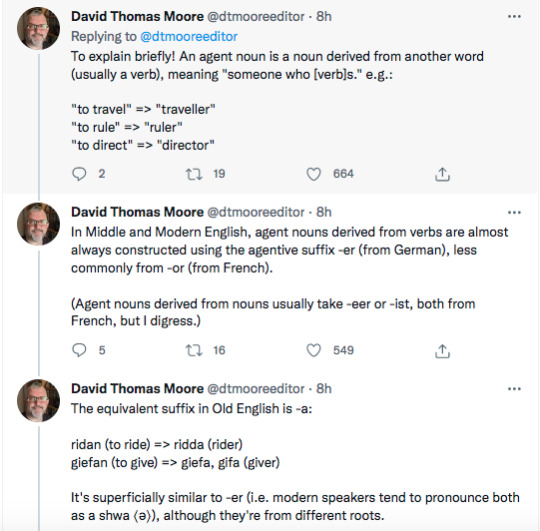
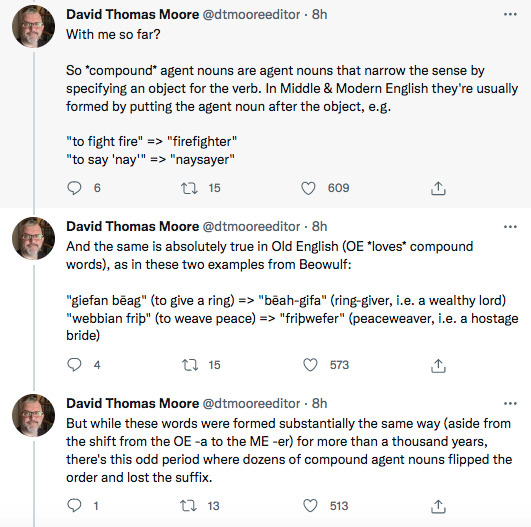
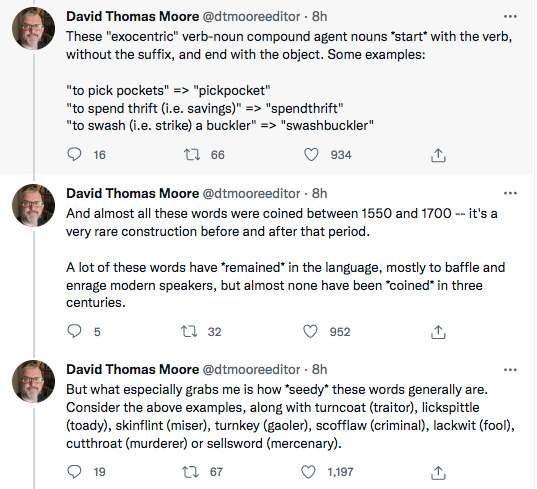
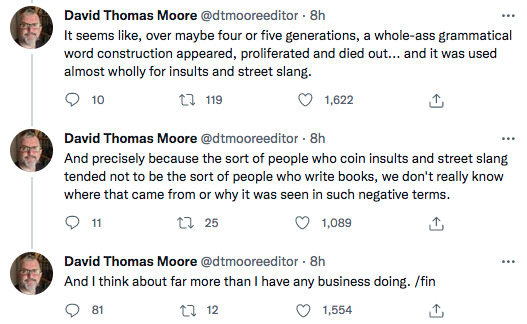
48K notes
·
View notes
Text
youtube
Literally i love his videos so much i cant stop binging
#etymology#english#english etymology#''sorry white boy eiden you did not invent clout which has existed since like 1946 and low-key which has existed since 1895.#you did invent chugga though.''
1 note
·
View note
Text

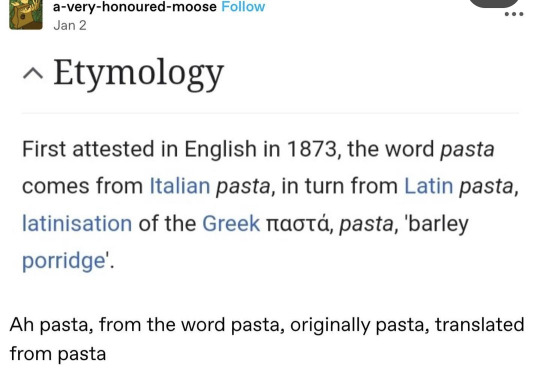

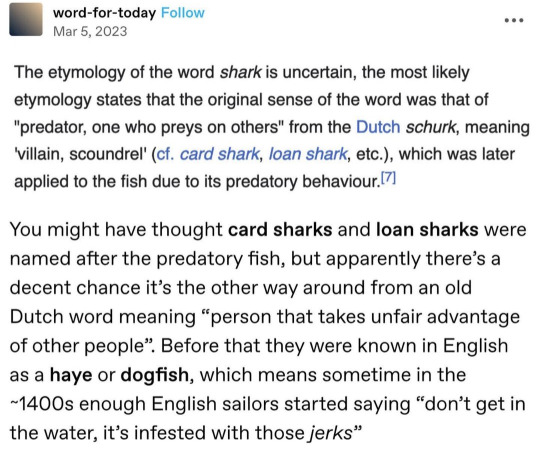


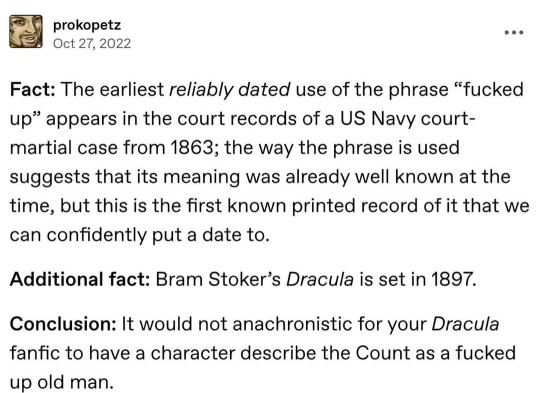

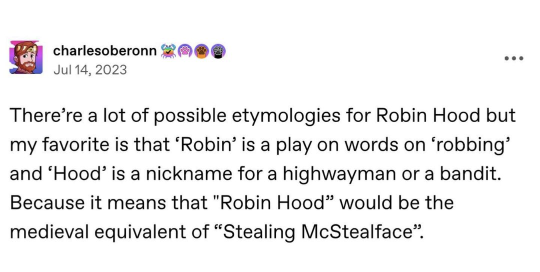
The sea is filled with jerks.
#etymology#words#linguistics#langblr#language#english language#the more you know#english langblr#tumblr screenshot#twitter
19K notes
·
View notes
Text
strange that "skinny" means thin. it should mean...skinny. characterized by skin. possessing or characterized by an above average amount of skin. more skin rather than less skin. but somehow it means less skin? preposterous
#*calls my local college English department* yes hello who is in charge here I have a complaint to make#yes a complaint of an etymological nature#what do u mean ur not in charge of that u r literally the English Department
18K notes
·
View notes
Text
Students of Ancient Inglic 3,000 years from now are going to be SO confused
midwife? I dare you to call her that again
44K notes
·
View notes
Text
so the thing about english is that people think it's so divorced from other germanic languages based on like. words. I've even heard people try to insist that english is a romance language. because of that whole messy business in 1066 with out-of-wedlock willy and his band of naughty normans. and now a good chunk of the vocabulary is french or whatever and they're prestigious so not using them makes you sound like a rube and this and that and the other
and yes william the conqueror will never be safe from me. I will have my revenge on him. he fucked up a perfectly good germanic language is what he did. this will be me in hell

but the thing is that most words in, say, german do have a one to one english equivalent. not all hope is lost, for those who still dare to see it. it's just that you 1066pilled normancels aren't looking in the right place
dog (en) ≠ der Hund (de) but der Hund (de) -> hound (en)
look with your special eyes. that one was easier. not all of them are this intuitive because of semantic narrowing and broadening and waltzing and hokey-pokeying and whatever else. I'll give you a few more
animal (en) ≠ das Tier (de)
aha! you think. I've got him on the ropes now.
but then
das Tier (de) -> deer (en)
nooooo!! you whine and cry in gay baby jail. the consonants are different!!! listen to me. listen, I say, putting both my hands on your shoulder. /t/and /d/ are the same sound. you just put your voice behind one of them.
nooooooooo!! you wail. deer are animals but not all animals are deer!!! listen to me. LISTEN. they used to be. animals used to be deer. that's just what we called them. it was a long time ago. it was a weird time in all our lives. it's okay.
let's try for a verb this time
to die (en) ≠ sterben (de) but sterben (de) -> to starve
same principle with the consonants, we're just changing a stop (where we completely stop the airflow and then let it through) for a fricative (where we still let some air go through. idk where it's going. maybe to its job or something.)
to starve used to mean generally to die, not just to die of malnourishment. we do that a lot. we take one word for a lot of things and make it mean one thing. or take one word for one thing and make it mean a lot of things. this is common and normal.
"okay but roland," you say, suddenly coming up with an argument. "what about tree? trees are super common. I don't think we'd fuck around too much with that. the german word is baum! what about THAT?"
"when did you learn german?" I ask, but then decide it isn't relevant right at this very moment. but fine.
tree (en) ≠ der Baum (de) but der Baum (de) -> beam (en)
beam??? you ask incredulously. beam???? BEAM?????? you continue with the same tone and cadence of captain holt from brooklyn 99.
yes. beam. like the evil beams from my eye I'm going to hit you with if you don't stop shouting.
but the vowels!!! you howl.
listen. listen to me. the vowels mean nothing. absolutely nothing. they're fluid like water. it got raised in english.
"WHAT DOES RAISED MEAN"
it doesn't matter right now. they were raised better than you, at least. stop shouting. open your eyes and see what god has given you. they're the same word.
"they're NOT the same word. they mean different things!"
we've been over this. they didn't used to. a beam was (and is) a long solid piece of wood. much like the long solid piece of wood I showed your mother last night.
FAQ:
Q: could english be some kind of germanic-romance hybrid?
A: do you become a sexy thing from the black lagoon just because you dressed up as one for halloween? english may have gotten a lot of vocabulary from norman french, but its history and syntax are distinctly germanic. that's what we base these things on.
Q: okay but what does it matter? this doesn't actually affect my day to day life
A: you come into my house? you come into my house, the house of an autistic man living in vienna austria and studying english linguistics and you ask me what does it matter? sit back down. I was going to let you go but now I have powerpoints to show you
Q: you're stupid and wrong and gay and a bad person
A: I know it's you, Willy

#I don't know what came over me#it was the devil#linguistics#english linguistics#etymology#shitpost nach sacher art#notification station
9K notes
·
View notes
Text
Transcendentalism is a hard word to grasp, so it's important to look at the etymology of it so you can parse its meaning. Trans - to be beyond or across Cen - one hundred Dental - Teeth Ism - the belief of So taken all together, transcendentalism means "the belief that one should have beyond one hundred teeth"
Hope this helps!
#thank you to one of my classmates for making this joke in english a little while back#transcendentalism#transcendental#funny#etymology
13K notes
·
View notes
Text
Calque & Loanword
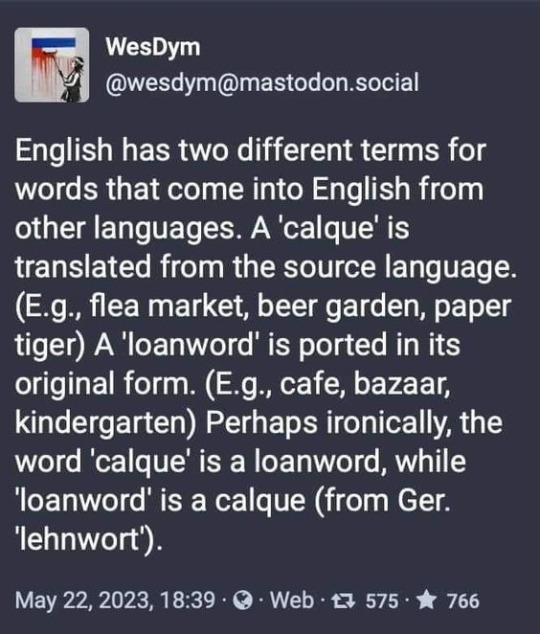
Found this. Kind of want to share.
#Languages#English#Calque#Loanword#loanwords#etymology#lingblr#linguistics#language#english language#terminology
2K notes
·
View notes
Text
so nobody knows the origins of the word balderdash, but it apparently started life as a word for a ludicrous mixture of drinks, such as beer, wine, and milk - just thought you might like to know this
5 notes
·
View notes
Link
Merriam-Webster’s Word of the Day:
Fruition must come from the word fruit, right? Not exactly—the apple falls a little further from the tree than one might think. Fruition and fruit are related (both ultimately come from the Latin verb frui, meaning "to enjoy"), but they came about independently. The original meaning of fruition had nothing to do with fruit. Rather, when the term was first used in the 15th century, it meant only "pleasurable use or possession," as when playwright and Shakespeare contemporary Christopher Marlowe wrote of "the sweet fruition of an earthly crown." Not until several centuries later did fruition develop a second meaning, "the state of bearing fruit," possibly as the result of a mistaken assumption that fruition evolved from fruit. The "state of bearing fruit" sense was followed quickly by the figurative application to anything that can be "realized" and metaphorically bear fruit, such as a plan or a project.
0 notes
Text
hmmmm i think i mightve gone overboard with the language abbreviations for the english etymology post. are these abbreviations necessary? do i need this many? was basing the abbreviations on native names a good idea? what should i do

3 notes
·
View notes
Text

Wool & lana
The word lana (wool) in languages such as Spanish is etymologically related to English wool. For words to be related, they don't have to look like each other. Instead, you have to be able to trace them back to the same ancestor through regular sound changes - and that's what linguists managed to do with wool and lana. The infographic shows the Germanic and Romance family trees of these words.
#historical linguistics#linguistics#language#etymology#english#latin#french#dutch#german#spanish#proto-indo-european#proto-italic#proto-germanic#gothic#norwegian#swedish#old norse#danish#icelandic#catalan#portuguese#italian#romanian#low saxon#frisian#lingblr
711 notes
·
View notes
